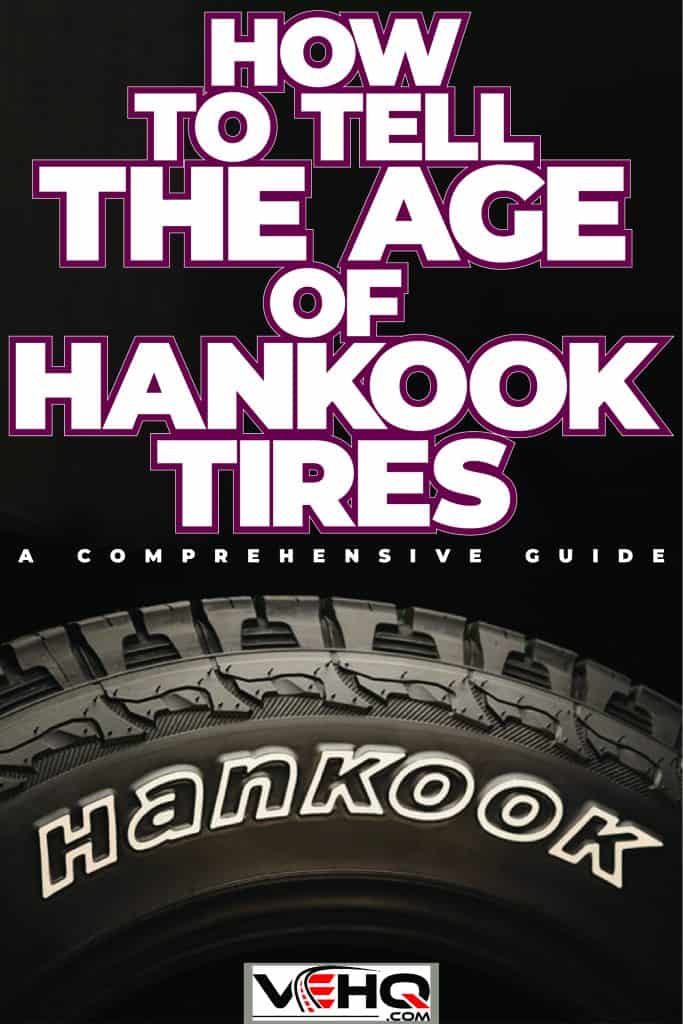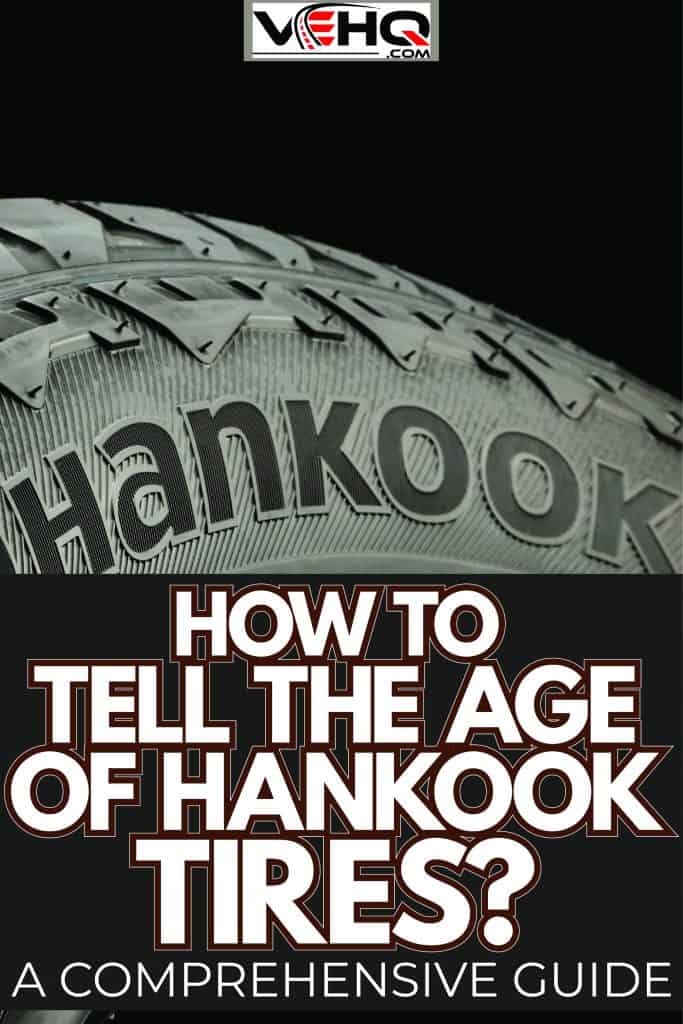Ever wondered how old your Hankook tires are? The age of a tire plays a significant role in its performance and overall safety.
As tires age, their components lose elasticity and flexibility, which can compromise traction and hinder vehicle control.
In this article, we'll guide you on how to determine the age of your Hankook tires, ensuring you're aware of their current state and can make informed decisions about their replacement.
While the tread of a tire may appear in good shape, its real age may tell a different story. Unraveling the mystery of your Hankook tires' age lies in decoding the markings on their sidewalls.
Within these seemingly cryptic numbers and letters lies valuable information about your tires' manufacturing date.
Curious to learn more? Read on to discover how to crack the code and unlock the secrets of your Hankook tires' age.
As you gain this newfound knowledge, you'll be empowered to make the best decisions for your vehicle's safety, performance, and longevity.
Remember, understanding your tires not only protects your investment but most importantly, ensures the safety of you and your passengers.
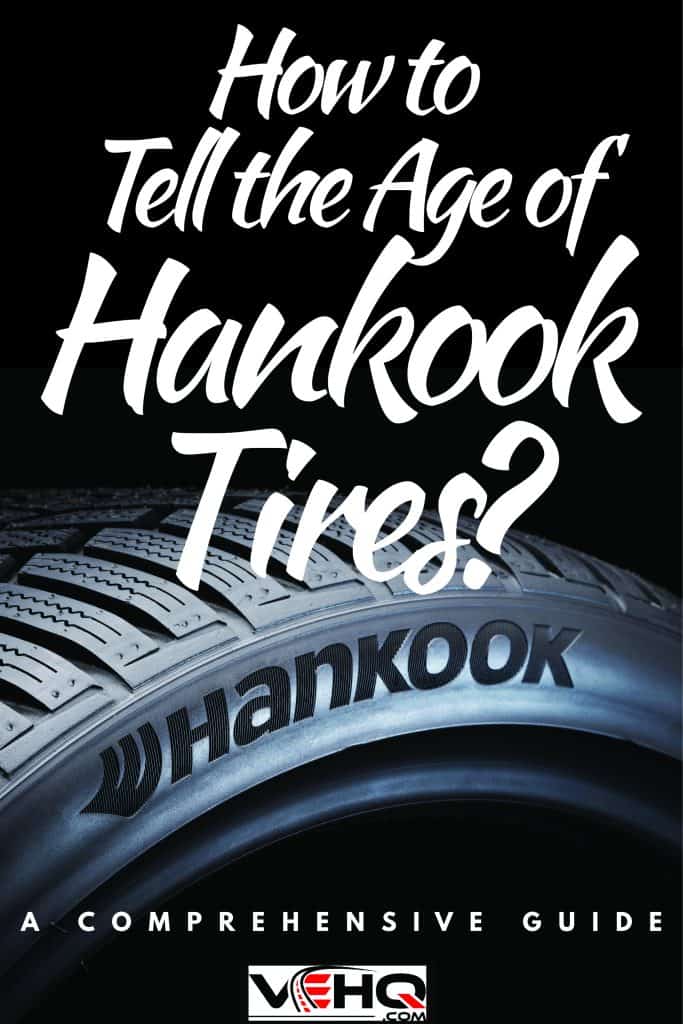
How to Tell the Age of Hankook Tires
Telling the age of your Hankook tires is essential to ensure their optimum performance and safety. To find out how old your tires are, simply look for the DOT code imprinted on the tire sidewall.
This unique tire identification number is mandated by the U.S. Department of Transportation.
The first two numbers following the DOT code indicate the week of production, while the last two numbers represent the year.
For instance, a tire with a DOT code of 1210 means that it was manufactured in December 2010.
In cases where the DOT code is difficult to read, it may be due to abnormal wear or scuffing on the tire sidewall. To counter this, simply check other tires on your vehicle for a clearer print.
For older tires with only a 3-digit DOT code, the process is slightly different. The first two numbers still represent the week, but the third digit indicates the year without specifying the decade.
This is because tires were assumed to be replaced within 10 years during those times. You can learn more about this by visiting wikiHow's guide.
Remember, knowing your tire's manufacturing date is crucial for proper maintenance and safety. So take the time to check your Hankook tires and ensure they're still in good condition for your vehicle.
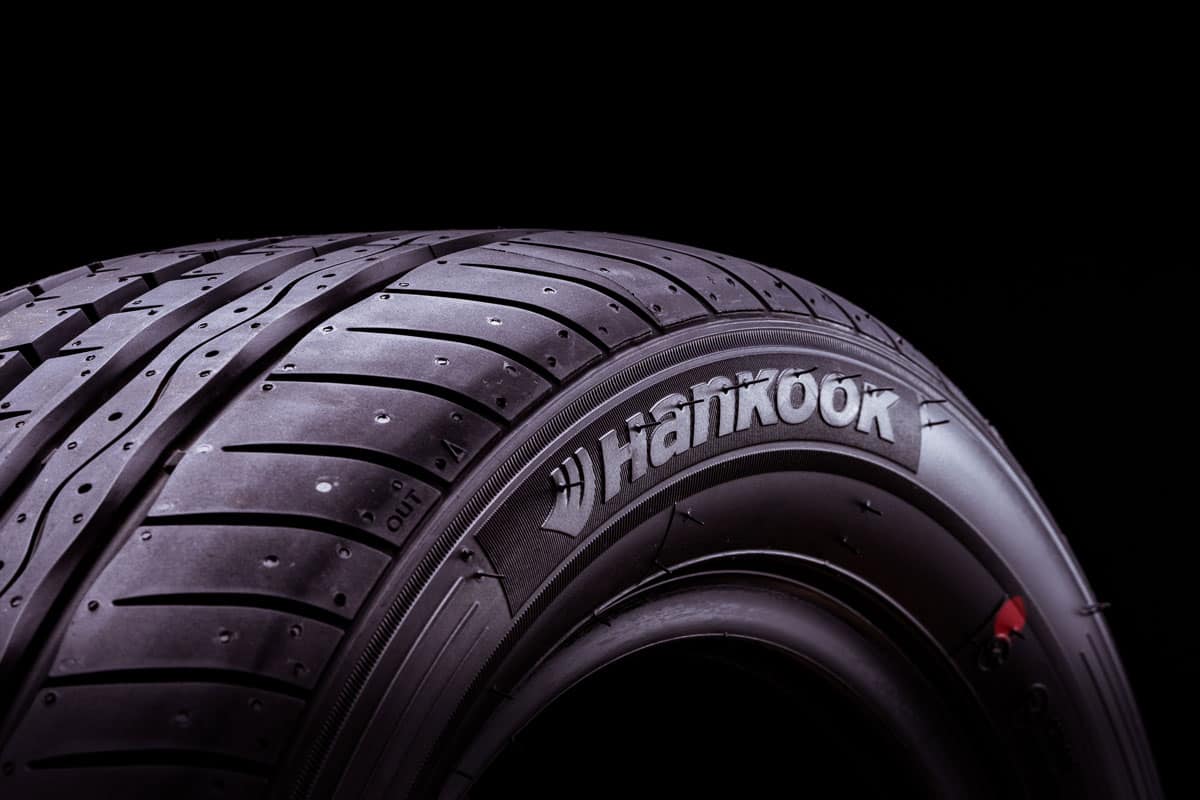
How Many Years are Hankook Tires Good for?
Hankook tires, a leading South Korean tire manufacturer, have long been known for their impressive performance and durability.
But, how many years can you expect Hankook's tires to last? In this section, we will explore the lifespan of these tires while considering factors such as warranty, maximum service life, and expiration date.
The lifespan of a Hankook tire is influenced by various factors like driving habits, road conditions, and the specific tire model.
While the manufacturer boasts a tire warranty for certain products, the actual lifespan often depends on the unique circumstances faced by each driver.
A significant aspect of a tire's longevity is its warranty coverage. Hankook takes pride in offering warranties for 50,000 miles or more on most of its products.
This coverage implies that the tires can last for a minimum of five years, assuming they are used within the prescribed conditions.
However, the manufacturer's warranty is not the only factor to consider when determining a tire's lifespan.
One should also pay attention to the tire's maximum service life, which is usually around 10 years from the manufacturing date. You can find this date by looking at the DOT code marked on the tire.
As for the expiration date, although it is not explicitly mentioned on the tire, experts recommend replacing tires once they reach their 10-year mark, regardless of their current state.
This is because the rubber material used in tires can degrade over time, becoming less effective and more prone to failure.
In summary, while Hankook tires are designed for longevity and come with impressive warranty coverages, various factors like driving habits, road conditions, and tire models will impact their lifespan.
Don't forget to routinely monitor your tires' condition and adhere to the manufacturer's guidelines to maximize their service life.
When Should I Replace my Hankook Tires?
Determining the right time to replace your Hankook tires is crucial for maintaining optimal vehicle safety and performance.
One critical factor to consider is the tire's age. As a rule of thumb, Hankook recommends replacing their tires after ten years from the manufacturing date.
Tire tread depth also plays a significant role in determining when to replace your tires. Proper tread-to-road surface interaction ensures a safe, comfortable ride.
A quick way to gauge tread wear is by performing the penny test, where inserting a penny into the tire grooves allows you to measure the remaining tread depth.

Another indicator of worn tires is visible cracking on the sidewalls. As the rubber ages, it may become brittle, increasing the risk of tire failure.
Checking your spare tire is equally important, as it may need replacement even if it hasn't been used.
Several performance factors can impact tire wear including driving habits, tire maintenance, and road conditions.
Ensuring proper tire pressure, alignment, and rotation will contribute to the longevity of your Hankook tires.
Monitoring various factors such as tire age, tread depth, physical appearance, and performance factors will help you maintain optimal vehicle safety and determine when it's time for a new set of rubber.
Remember to consult a professional if you're unsure about any aspect of tire replacement.
How Many Miles
Hankook tires are known for their quality and durability. The miles a Hankook tire can last depends on a variety of factors.
The average lifespan of a Hankook tire is about 40,000 miles. However, driving conditions play a significant role in their longevity.
For instance, frequent driving on rough roads or in extreme weather conditions can reduce the lifespan of your tires.
The type of vehicle you drive can also influence the number of miles before you need to replace your Hankook tires.
Some high-quality Hankook passenger tire models can last more than 60,000 miles, depending on the performance type.
Of course, proper tire maintenance and care are essential to getting the most mileage from your tires.
Tire age is another important consideration. The manufacturing date of a tire is located in its DOT code on the sidewall.
This code consists of up to 13 letters and numbers, with the last four digits representing the week and year of manufacture.
It is recommended to replace your tires when they reach six years of age, regardless of their mileage or visible condition.
This is because, over time, the rubber and other components in the tire can degrade, compromising safety and performance.
The miles your Hankook tires can cover depend on multiple factors, including your driving habits, vehicle type, and tire maintenance.
To maximize mileage and safety, keep track of your tire's age and inspect them regularly for any signs of wear or damage.
Is Hankook a Good Brand of Tire?
When it comes to tire manufacturers, Hankook is a leading name in the industry. Founded in 1941, this South Korean company has expanded its global presence with headquarters in America, Europe, and China.
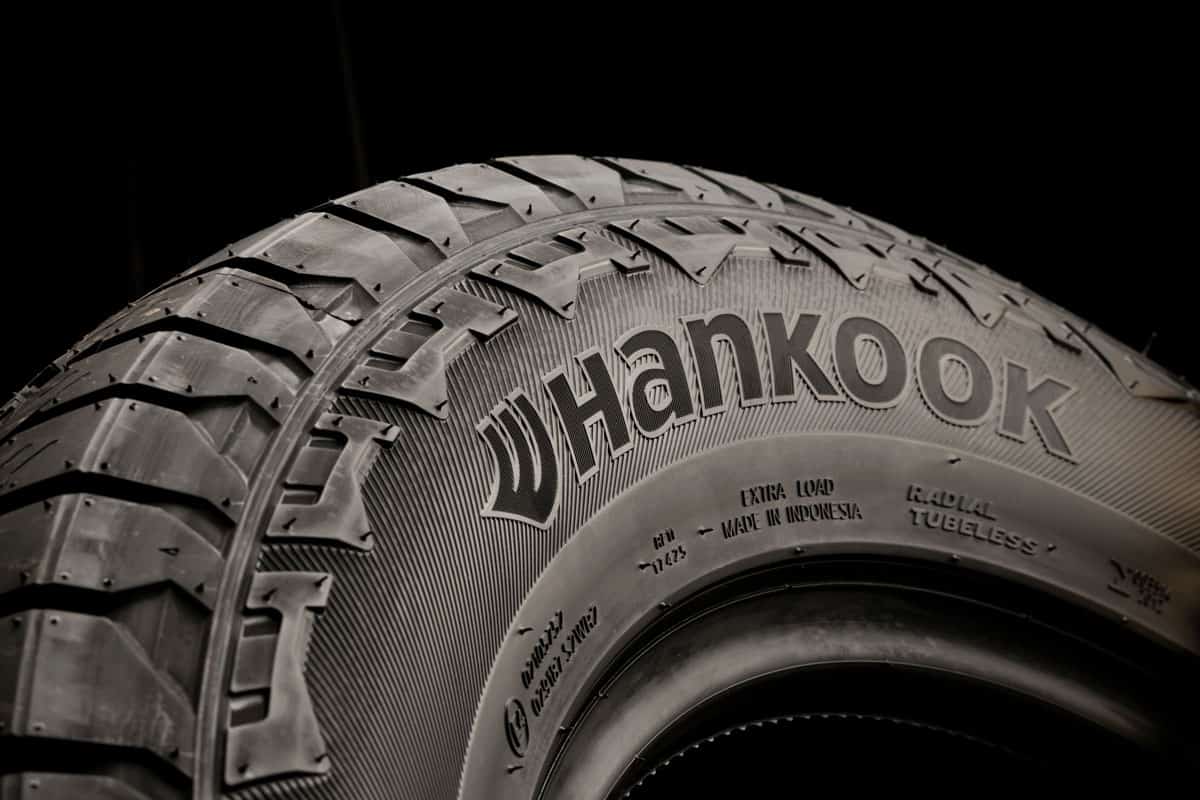
Comparing Hankook to other giants in the tire industry, such as Michelin, is important to know their quality.
Hankook offers a wide range of tire options, covering various vehicle types and driving conditions, which shows their expertise in the market.
One of the key factors to consider when evaluating a tire brand is its longevity. In this aspect, Hankook excels by providing premium quality tires that can last at least 5 years.
When examining Hankook's performance across different terrains, they consistently receive positive feedback.
From smooth highways to rough off-road adventures, Hankook tires are known to provide stability, optimal handling, and a comfortable driving experience.
Regarding their commitment to innovation, Hankook invests in research and development to continuously improve their products.
This dedication is reflected in the tire manufacturer's comprehensive collection of tires catering to various driving preferences and weather conditions.
Overall, Hankook is a reliable brand of tire, offering great value for money, longevity, and diverse options for various driving needs.
It holds its own against competing giants in the tire industry, such as Michelin, and continues to raise the bar in terms of quality and innovation.
To determine the age of your Hankook tires, refer to the tire date code stamped on its sidewall.
Are Hankook Tires Good Iin Rain?
If you're wondering how Hankook tires perform in wet conditions, you've come to the right place.
Handling rainy weather can be quite a challenge for many tires, but Hankook has put great effort into designing its products to tackle this issue effectively.
Hankook tires are expertly engineered to maintain a strong grip on wet pavements, ensuring you have better control during your drive. This allows for confident turns and safer rides even when weather conditions are unfavorable.
The key to Hankook's success in wet conditions lies in its innovative tread patterns and compound technologies.
These specialized designs help to channel water away from the contact patch, maximizing traction and reducing the risk of hydroplaning.
Furthermore, the optimized combination of flexible compounds and robust construction in Hankook tires ensures adequate stiffness for precise handling, even during compromised traction situations.
This ensures drivers can maintain control and stability during wet conditions.
It's important to remember that while Hankook tires offer impressive performance in rainy weather, each model may perform differently.
Therefore, you should research specific tire models and types of Hankook tires to ensure they are tailored to your specific driving needs and habits.
In conclusion, Hankook tires have proven to be a reliable choice for drivers seeking enhanced performance during wet conditions.
Their meticulously designed features prioritize both safety and control, ensuring a solid and enjoyable driving experience, regardless of the weather.
Tips to Choose the Right Tire Brand for You
Choosing the right tire brand can be a daunting task, but understanding your needs and priorities can guide you in the right direction.
Consider the driving conditions you typically encounter and your vehicle type, as different tires are designed for various applications.
Tire performance varies depending on the rubber composition used by the tire manufacturer.
Some brands may focus on longevity, while others prioritize grip and handling, making it crucial to consider these factors when shopping.
Your vehicle type also matters—whether you drive a sports car, SUVS, or truck—as each requires specific tire characteristics.
Sports car owners may benefit from high-performance tires that offer improved handling and grip, while SUVs and trucks may need all-terrain or all-season tires to handle various road conditions.
Researching various tire manufacturers is essential, as different brands excel in specific areas. For instance, Hankook Tires has a proven track record of providing high-quality tires across a range of vehicle types.
Budget is another important factor to consider. While price doesn't always indicate quality, paying more for a well-known, reputable brand could provide peace of mind and reliable performance.
Lastly, read customer reviews to gain insights into the experiences of others. This can help verify whether your desired tire brand will fit your needs and expectations.
Tire Maintenance Tips
Proper tire maintenance is essential for ensuring your Hankook tires are safe and long-lasting. One crucial aspect is monitoring the age of your tires. To help prolong their lifespan, consider these tips.
Another key factor in tire maintenance is to regularly inspect tires for signs of dry rot and cracking. Protecting tires from harmful UV rays can minimize premature aging.
When parking, choose a shaded spot or utilize tire covers to shield them from direct sunlight.
Moreover, be mindful of ozone exposure. Ozone is a gas present in the atmosphere that can degrade rubber over time.
Minimize exposure by parking away from ozone sources like generators, HVAC systems, or other outdoor industrial equipment.
Fluctuating temperatures can also impact tire longevity. To prevent unnecessary wear, maintain consistent air pressure and monitor tires during seasonal shifts.
Proper tire storage is also crucial; store tires in a cool, dry, and dark environment such as a warehouse.
Maintaining your tires includes regular inspection for wear and damage. Rotate them every 6,000 to 8,000 miles to ensure even wear across all four tires.
This helps improve traction and overall performance when you accelerate or stop.
Lastly, it's important to consult industry experts and follow manufacturer recommendations for tire maintenance procedures.
By taking care of your tires, you can enhance their life span and keep yourself safe on the road.
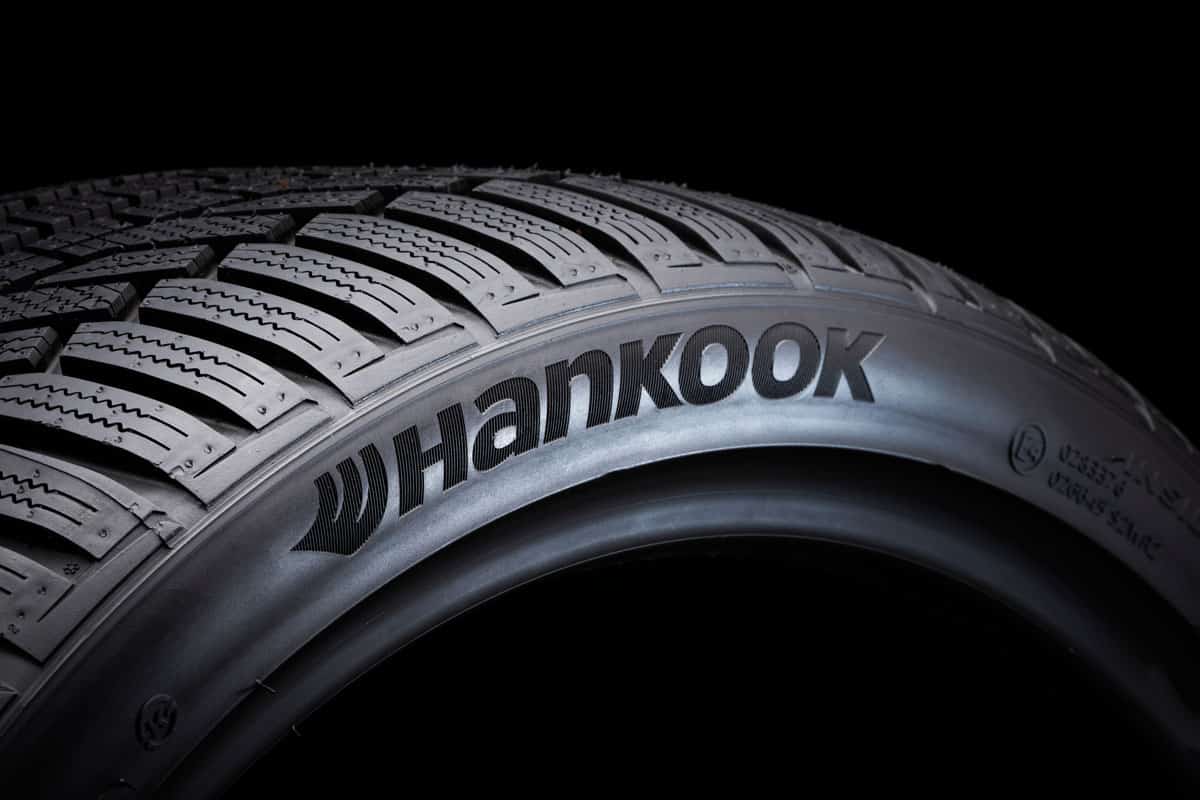
Additional Factors to Consider
When evaluating the age of Hankook tires, it's crucial to look beyond the week/year format stamped on the sidewall.
Organic materials, such as rubber compounds, comprise tires and degrade over time due to environmental oxidation.
This degradation can lead to dry rotting, compromising the tire's durability. Proper inside tire storage is essential to prevent premature aging of the tire materials.
Store tires in cool, dry environments away from sunlight and fluctuating temperatures.
Remember, the purchase date may not be indicative of a tire's actual age. Sometimes, a customer may receive a discount on older tires that have been sitting in the retailer's inventory.
Visual inspection is necessary to assess the condition of a tire's sidewall and tread, even if it wasn't used extensively.
Molded features on tires may wear away due to driving on various terrains, further impacting the tire's health.
Winter tires, used seasonally, need extra care during storage in warmer months to ensure their longevity.
Ultimately, consider all these factors in conjunction with the tire's manufacturing date to make informed decisions about tire replacement and maintenance.
Check out some of our previously written articles before you go:
Tire Talk: How Many Miles Can You Get Out of Nexen Tires?
Antifreeze vs. Professional Tire Balancing: Can You Use Antifreeze To Balance Tires?

